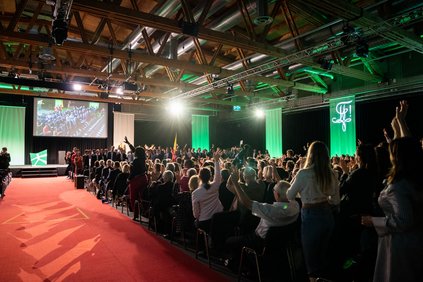Campus - 06.05.2015 - 00:00
Last-minute preparations
The St. Gallen Symposium is traditionally organised by students of the HSG within a period of ten months. Student Sophie Kwisda interviewed co-organiser Jean-Rodolphe Linder about the last-minute preparations before the opening ceremony.

5 May 2015. Sophie Kwisda: Jean-Rodolphe, you were responsible for the French, Belgian and Luxembourg markets in the International Students’ Committee (ISC). What jobs did your remit involve?
Jean-Rodolphe Linder: Like team colleagues in other market, I contacted and met entrepreneurs, executives and also political leaders from these three markets, ultimately to convince them of the idea of the Symposium, i.e. to create a dialogue between the generations. The next goal was to persuade them to participate as a speaker, on the one hand, or to provide financial or ideational support.
How did those entrepreneurs, executives, politicians and CEOs receive you as a student?
As ISC members, we make an effort to display as professional an appearance as possible. Then again, we also want to quite deliberately retain this student charm. Generally, people are pleased that we meet them for this and offer them a refreshing change from their daily work. It’s enriching for them to sit in their offices with a student and talk to them about everything. So most of them are pleased.
As a member of the organising committee, you invest ten months full-time in a three-day event. You don’t attend any lectures during this time but will still be awarded eight to twelve credit points (ECTS). This can’t be all the reward for your work, though. I wonder what skills you have been able to acquire during this time.
You’re quite right, the twelve credits aren’t everything. They’re a concession made by the University, a recognition of the work done on the campus. Most of us don’t do it because of the credits, that’s clear. Rather, I see the Symposium much more as a school for life where for one thing, we become acquainted with really intensive team experiences. Intensive, on the one hand, because we live on top of each other all day long and can’t avoid anyone, particularly if you have to talk about something with them. But on the other hand also extensive because after all, we work together for more than ten months. First, each of us travels around our markets, and then we meet again in St.Gallen.
Yes, team experience is one of the most important learning processes here. Also, it’s an enrichment for your own personality because you reach your psychological and physical limits and find out what you can actually endure. For instance, if you have to do two night shifts in a row, this may sound trivial but shows you what you can manage. Then again, you’re confronted with situations to which you’ve never been exposed before. For example, a contact wanted to bring his wife along to the Symposium. Since this is not according to our plans, I had to communicate this clearly to him. This is why you have to learn to be confident. You also learn to look after several projects at once and to be flexible.
As you’ve mentioned, you’ve had to overcome some obstacles in the last ten months. Was there ever a moment when you wanted to pack it in?
No, there wasn’t for me. For one thing because I was looking forward to the Symposium from day one. I’d already been helping out at the Symposium the previous two years, and both times I’d been so enthusiastic about it and overwhelmed by the whole atmosphere. It was an absolute compulsion for me, I had to be part of this. Even if you have to write another letter at two in the morning or have to do a nuisance job in between and you think, “Why am I doing this?” But in the end, the anticipatory pleasure from this conference outshines such moments. Of course you need a lot of staying power to get through the whole ten months. If one member can’t hack it any more, then the team is still here. Then you get a grip on yourself, and that’s why we work in a house to make sure you can pull the others along.
The Symposium will start tomorrow. You’re responsible for catering. What are the last few steps before this big event?
On the one hand, I and two team colleagues are taking care of the sponsors’ dinner, the start to the Symposium. On the other hand, I’m responsible for the ISC Lounge on the roof terrace, and finally for the catering for the 350 auxiliary personnel who work for the Symposium for a week on a voluntary basis. Now the seating is being arranged for the dinner, the tables are being set out and nicely laid for the dinner. The bar on the roof terrace is being set up and got ready to make sure that tomorrow everything can become operational. Menus and beverage lists are still being prepared, the coffee machines are being got ready, cutlery and crockery are being distributed, and finally everything will be tidied up. So there’s still quite a lot to do.
So I won’t keep you longer. But I’d like to ask you a final question: who are you looking forward to most?
From among the speakers?
Exactly.
I asked because I’m most looking forward to my parents. Team members’ parents have been invited to the Symposium, and I’m hugely looking forward to welcoming them here, that they can now see what I’ve been working for for ten months and that it’s really been worth putting up with me in difficult moments. Apart from my parents, I’m looking forward to Anders Fogh Rasmussen, the former Secretary General of NATO, and to Prof. Philippe Sands, who will focus on the issue of fundamental rights and the individual in society.
Also, I’d like to point out the public event on “Female Entrepreneurship” in the Library – four young women entrepreneurs from all over the world will share their experiences.
More articles from the same category
Discover our special topics











